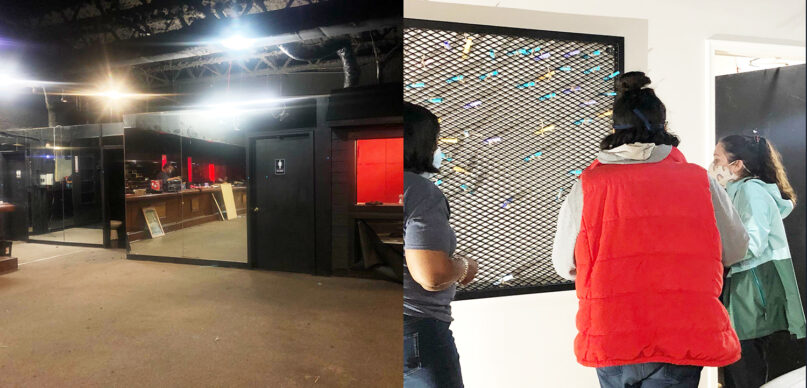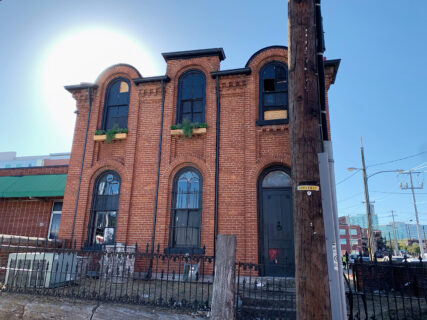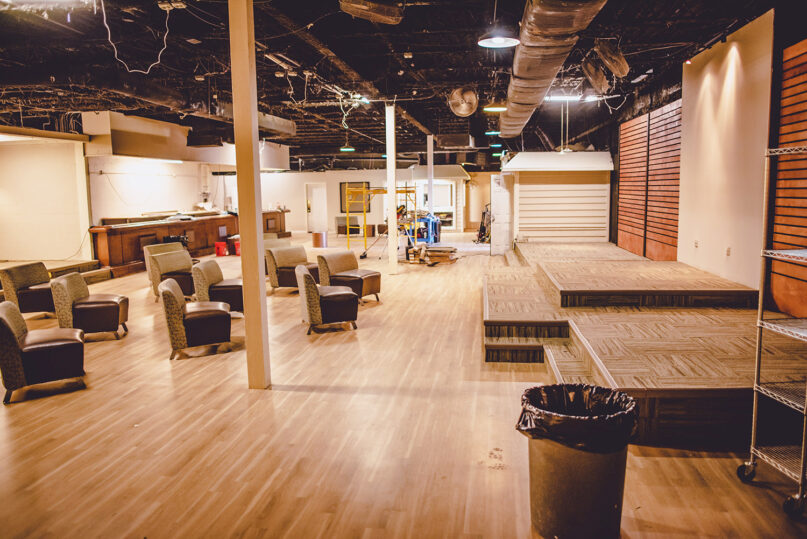NASHVILLE, Tenn. (RNS) — The red-brick building at the corner at 701 Drexel St. in Nashville has a colorful history.
In the early 1900s, it was home to a Catholic school founded by a saint to educate Black children in Jim Crow Tennessee.
By the early 2000s, the building had become a sex and swingers club.
This week, it reopens as a faith-based shelter for the homeless, thanks in part to COVID-19.
The former Menages club needed a lot of work and prayer to be ready for that new mission, said Rachel Hester, executive director of Room in the Inn, the nonprofit which bought the building earlier this year. Room in the Inn staff painted the space, took out dancing poles and set up a prayer wall by the former club’s bar.
“The more our staff sanded boards, painted walls and told stories, the more that building healed,” Hester said.
The swingers club-turned-shelter, now known as Drexel House, is one of a number of pandemic innovations made by faith-based groups that serve the homeless.
More than half a million people experience homelessness in the United States, according to a 2020 report from the National Alliance to End Homelessness. And faith-based groups “provide the backbone of the emergency shelter system,” according to the NAEH.
Many of those groups have faced challenges during the pandemic. Social distancing requirements have reduced the number of shelter beds available and made it harder to deliver services such as counseling and support groups.
For many of Room in the Inn’s guests, there’s been no place to go during the pandemic, said Hester. Fast-food dining rooms and libraries, often safe havens from the streets, have been shuttered. Day centers have had to limit the number of people who come inside and can no longer house AA meetings or counseling sessions. Older volunteers who once helped out are no longer able to do so.
So faith-based groups like Room in the Inn have had to get creative.
“I have been doing this for 30 years and I feel like a pioneer,” said Hester.
Room in the Inn got its start at Holy Family Catholic Church in Nashville in 1985. That winter, some homeless Nashvillians were sleeping in the church’s parking lot after the camp they’d set up by the Cumberland River had been shut down.
The church’s then-pastor, the Rev. Charlie Strobel, invited them inside.
“I told them teasingly, ‘Don’t hurt each other and don’t burn the building down. I’ll bring you breakfast in the morning,’” he told The Tennessean newspaper in recalling the early days of the ministry. I thought about whether I should do this because if I did, I might do it the rest of my life.”
Strobel would later send a letter to other congregations in Nashville, asking them to open their doors as temporary shelters. Four churches signed up for the new program, which was christened Room in the Inn — after the biblical story of Joseph and Mary being unable to find a place to stay in Bethlehem the night of Jesus’ birth.
Eventually, almost 200 congregations joined the coalition as well, offering a hot meal and a safe place to sleep — often on a mattress in a church gym or classroom — to 1,500 people during the shelter season each year.
COVID-19 has changed all of that. Many of the congregations that have hosted shelters in partnership with Room in the Inn in the past are still closed down for in-person worship or don’t have space to social distance.
“Right this second, I have 41 congregations out of 200 that are participating,” said Hester.
To offset the loss of shelter space at churches, Room in the Inn will use a hybrid approach, sheltering some people at churches and others in several central locations, including the gym at a former Catholic school and the second floor of its day center in downtown Nashville.
The Drexel House will also be used for shelter, returning to its original faith-based identity.
In 1909, the building opened as Immaculate Mother Academy, the state’s first Catholic primary and secondary school for Black children, founded by St. Katharine Drexel and the Sisters of the Blessed Sacrament.
Charlotte West, 74, a longtime volunteer from St. John African Methodist Episcopal Church, is grateful the Drexel House will once again be a place of ministry.
“We are so blessed to have it,” she said.
And there’s a lesson, she said, in the building’s past. She said people, like buildings, can get off-track. But that’s not the final word.
“If buildings can come back,” she said, “so can we.”

Formerly a swingers club, the Drexel House has converted the space to serve its new purpose as a homeless shelter. For example, an old mirrored wall, left, now serves as a prayer wall, right, to hold the prayers of visitors to the house. Photo courtesy of Melanie Barnett
For West and other members of St. John AME, having the central shelter location means their ministry with homeless guests can continue. The church has participated in Room in the Inn since the 1980s. But in March, a tornado hit Nashville and destroyed their building, meaning they could no longer host a shelter.
Still, West and other longtime volunteers like Erskine Lytle, 74, want to lend a hand. They hope to start volunteering at one of the alternative shelters set up by Room in the Inn in a few weeks.
“The need is still there,” said Lytle, who has volunteered since 1987.
The Catholic Diocese of Nashville has set up a central site for Room in the Inn at St. Vincent de Paul parish, which was also founded by St. Katharine Drexel. The diocese spent $50,000 to renovate a space that once housed a gym for a parish school, adding a kitchen and other improvements. That space will now serve as a central location for Catholic parishes involved with Room in the Inn.
The diocese also donated $50,000 toward the nonprofit’s budget, said Brian Cooper, the diocese’s chancellor. Cooper, whose family has volunteered with Room in the Inn, said it was important to step up and help during the pandemic.
“Necessity is the mother of invention — the Holy Spirit has guided us,” he said.
Room in the Inn has also stepped up other services during the pandemic, setting up telehealth stations in the day center and serving meals every day since the pandemic began. Recently, Hester said, the ministry started allowing people to sit at tables in a courtyard outside the building. It was the first time many of their guests had sat down at a table in months.
Houses of worship and other faith-based groups have also stepped out in other parts of the country to help, even if they can’t host homeless guests in their buildings.
Journeys, a nonprofit that serves the homeless in the north and northwest suburbs of Cook County, Illinois, has relied on about two dozen faith-based partners to run its temporary shelter program called PADS in the past. In March, its church-based shelters were at full capacity when they had to shut down due to COVID-19.
The agency, which had run temporary shelters in the churches since the early 1990s, moved about 100 clients to several hotels, with the help of a donation from the Clerics of St. Viator, a Catholic order based in Arlington Heights, Illinois, said Suzanne Ploger, development director for Journeys.
At the time, the agency had committed to sticking with the clients it was sheltering as long as it could. But its leaders were not exactly sure how they would pay for it until government funding kicked in.
“We took a leap of faith and trusted that our community would support us,” Ploger said.

Drexel House. Courtesy of Melanie Barnett
Other faith groups have chipped in to supply meals or to help support the agency’s work with the homeless. Carol Marie O’Marrah, the agency’s shelter director, said the agency will be relying on that help for the foreseeable future.
O’Marrah said it was unlikely church-based shelters would open back up until there is a vaccine or other major improvements in the public health outlook for COVID-19.
Journeys also began offering telehealth counseling and other services by phone or internet during the pandemic and started sending case managers out to meet with clients, rather than asking clients to come to the agency’s offices. Those changes may stay in place, even after the pandemic ends.
In Anne Arundel County, Maryland, the Winter Relief program, which has worked with faith groups to provide temporary shelter at houses of worship since 1992, has also moved to a hotel model of offering shelter.
Some of the churches that would have housed shelters aren’t open for worship services, said Mario Berninzoni, executive director of the Arundel House of Hope in Glen Burnie, Maryland. Others could offer space but not volunteers.
“At these churches, a lot of volunteers are elderly and they are at higher risk,” said Berninzoni. “I feel like their hands are tied.”
In Dallas, one pastor hopes a zoning change will encourage churches and other houses of worship to open their doors as shelters this winter. The city’s zoning code bars churches from serving as temporary shelters, said Wayne Walker, who runs a nonprofit organization called Our Calling.
Walker said he and other local ministers have been working with Dallas city officials on changing that. He hopes the council will vote in November to allow churches to apply for permits to serve as emergency shelters.
In the past, Our Calling and other faith groups have run shelters that violated city laws.
“We have to make sure that people don’t die out on the street,” he said. “We are going to do what we are called to do.”
Adding more shelters will be crucial during COVID-19, said Walker, as existing shelters have had to reduce capacity because of social distancing. Meanwhile, he said, the unsheltered population in Dallas continued to grow.
“We are looking at a 1,200-bed shortfall,” he said.
Walker said he has already started calling churches to encourage them to open as shelters if the law is changed. The need is great, he said, and likely to grow even greater, especially if a federal moratorium on evictions is lifted.
“If they started evicting people between now and when cold weather hits, it is going to get worse,” he said.
In the meantime, Walker said Our Calling, which he described as a “discipleship ministry for the unsheltered, homeless community,” will continue to help people on the streets with spiritual and physical needs.
The group has designed a smartphone app to help those who are homeless anywhere in the U.S. find the nearest shelter and other resources. Walker said the app is now delivering thousands of referrals a day.
Back in Nashville, Lytle is eager to get back to work helping Room in the Inn. He first found out about the program 33 years ago, after a friend asked him to help count homeless folks in Nashville living under bridges and by railroad tracks. The friend then invited him to a meeting for churches interested in getting involved in Room in the Inn. He took the idea back to his church’s lay organization, and its leaders said yes almost immediately.
They’ve been involved ever since.
“I’m blessed,” Lytle said. “I have to do whatever I can to pass it on.”





